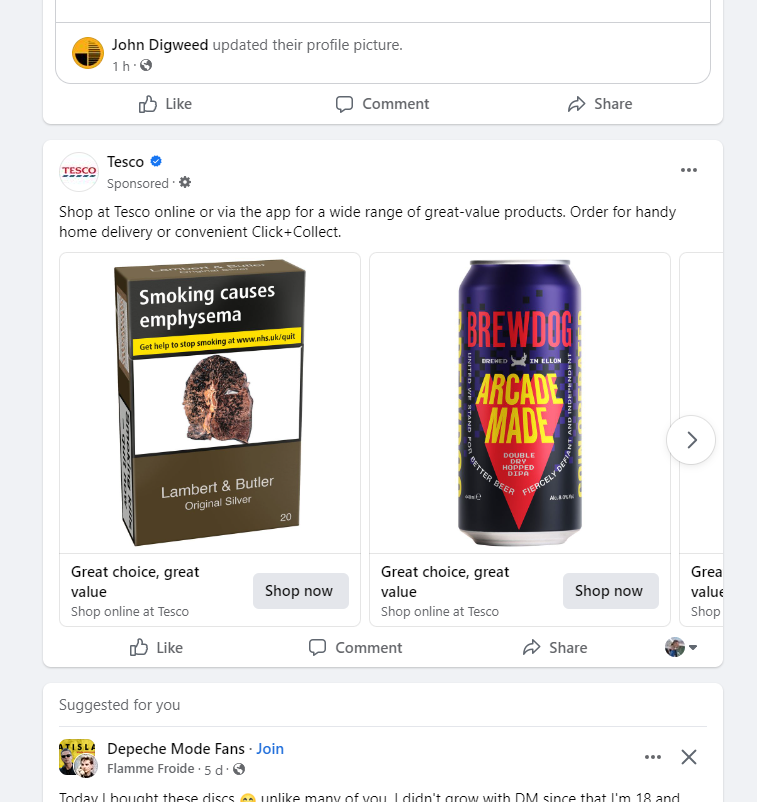ASA rules against Boots baby formula Google Ads – a cautionary tale
You might have spotted this story in the news this morning, discussing the Advertising Standards Authority (ASA) decision that Boots had broken advertising rules by promoting infant formula through Google Ads: https://www.bbc.co.uk/news/business-66582141
So how did Boots wind up placing Google Ads for something it’s against the law to advertise? And how can you make sure that your adverts don’t encounter similar issues?
The problem with Boots’ baby formula Google Ads
It’s against the law in the UK to advertise baby formula for babies younger than six months, due to the risk of it encouraging new mothers to stop breast feeding.
Boots continually runs Google Ads campaigns for a huge range of products. The problematic adverts were for four of the infant formula brands they stock.
For example, one advert was for “Aptamil 1 First Baby Milk Formula Powder From Birth 800G”.
Clearly this is formula for babies under six months of age, and therefore in breach of the rules. This is the full ASA ruling which resulted: https://www.asa.org.uk/rulings/boots-uk-ltd-a23-1194236-boots-uk-ltd.html
After the ASA ruling, Boots apologised and stated that it had removed all the adverts.
What went wrong?
The adverts were most likely Google Shopping Ads, which display images of products when you search Google. You can click on the ads to go to the company’s website and purchase the product.

Boots would have set up the adverts through the Google “Merchant Center”. When doing this you need to take care to exclude any products you are forbidden to advertise.
Boots stated, in their response to the ASA ruling, that the error came in because they updated their list of products to be excluded, but failed to pass this on to the team who were managing their Google Search Ads.
A simple human error which has lead to a lot of headlines and headaches for Boots.
Tesco advertising cigarettes in Google Ads
Boots are by no means the only retailer to fall foul of not setting up their online ads correctly.
For example, earlier this year we spotted Tesco advertising cigarettes in a Facebook feed!

Why don’t Google automatically filter out banned products?
We don’t know the answer to this, but we suspect it’s about the cost of maintaining those rules given that they’d need to differ them in every country in which Google operates. And, if Google start making too many decisions about what you should or shouldn’t be allowed to advertise, there would certainly be a “big brother” backlash.
Google’s advertising policy does ban adverts for:
- Counterfeit goods
- Dangerous products or services
- Enabling dishonest behaviour
- Inappropriate content
These are Google’s general policies, not country-specific ones.
It also emphasises that each advertiser is “always responsible for ensuring that you comply with all applicable laws and regulations, in addition to Google’s advertising policies, for all of the locations where your ads are showing”.
What are the takeaways for small businesses running Google Ads?
Use a professional Google Ads manager
First of all, ensure that your Google Ads are being managed by an experienced team who regularly check how and where your adverts are appearing. Oddities will always crop up from time to time, but a good Google Ads manager will spot and deal with them straight away.
For example, we were running Google Ads for a psychometric analysis product. Out of the blue, the phrase “psychometric test” started to trend on social media, due to a completely unrelated app going viral. We immediately amended the advertising campaign to prevent our client paying for clicks from people seeking the new app, which were never going to convert for our client. If we hadn’t been monitoring the advertising campaign closely this could have been very costly.
Make sure you give your Google Ads manager the right information
The Boots issue was all caused by a simple breakdown in communication; the advertising team not being given the updated list of products to exclude from Google Ads.
Make sure your Google Ads team is completely aware of any advertising restrictions – be these legal stipulations or business strategy decisions. You know your industry better than they do, so don’t assume they’ll pick up all the nuances.
And when something changes, remember to update them.
For example, we work with an aesthetics clinic offering services such as botox, dermal fillers and laser treatment. This is quite a minefield in advertising because you are not allowed to advertise prescription-only medicine. Therefore, none of our advertising (or social media work) can mention botox, or allude to treatments/conditions in any way which could only mean botox (eg we can’t say “antiwrinkle injections” instead). We keep up to date with the guidelines ourselves, and ensure that any advertising is approved directly by the client before it goes live.
Get a Google Ads healthcheck
If you’re not sure how well your Google Ads are running, or are concerned that they could be putting your company at unnecessary risk, then please get in touch for a Google Ads healthcheck.
